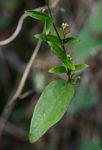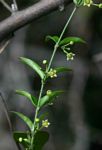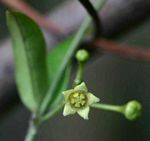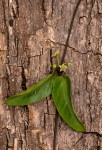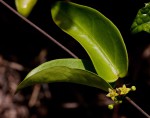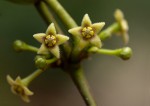Vincetoxicum anomalum
Selected images: Click on each image to see a larger version and details of the record View all images (10)
Detailed records: Display species records QDS maps by: Google Maps Point records by Google Maps
Species details: Click on each item to see an explanation of that item (Note: opens a new window)
| Synonyms: |
Cynanchum chirindense S. Moore Cynanchum papillosum Weim. Tylophora anomala N.E. Br. |
| Common names: | |
| Frequency: | |
| Status: | Native |
| Description: |
Robust perennial twiner or climber with milky sap. Leaves opposite more or less narrowly ovate, mucronate at the apex. Flowers in branched axillary heads. Fruit usually a single slender, pointed follicle. |
| Type location: |
South Africa |
| Notes: | |
| Derivation of specific name: | |
| Habitat: | In evergreen forest and gully forest near streams. |
| Altitude range: (metres) | 1150 - 2000 m |
| Flowering time: | |
| Worldwide distribution: | Kenya, Tanzania, Malawi, Mozambique, Zambia and Zimbabwe |
| FZ divisions: | E,S |
| Growth form(s): | |
| Endemic status: | |
| Red data list status: | |
| Insects associated with this species: | Amauris echeria lobengula (Food plant) Amauris ochlea ochlea (Food plant) |
| Spot characters: | Display spot characters for this species |
| Images last updated: | Wednesday 8 February 2012 |
| Literature: |
Burrows, J.E. & Willis, C.K. (eds) (2005). Plants of the Nyika Plateau Southern African Botanical Diversity Network Report No. 31 SABONET, Pretoria Page 75. Chapano, C. & Mamuto, M. (2003). Plants of the Chimanimani District National Herbarium and Botanic Garden, Zimbabwe Page 18. As Cynanchum chirindense Dowsett-Lemaire, F. (1989). The flora and phytogeography of the evergreen forests of Malawi. I: Afromontane and mid-altitude forests; Bull. Jard. Bot. Nat. Belg. 59(1/2) Page 24. Goyder, D.J., Gilbert, M.G. & Venter, H.J.T. (2020). Apocynaceae (Part 2) Flora Zambesiaca 7(2) Pages 355 - 356. Mapaura, A. & Timberlake, J. (eds) (2004). A checklist of Zimbabwean vascular plants Southern African Botanical Diversity Network Report No. 33 Sabonet, Pretoria and Harare Page 20. as Cynanchum chirindense Ntore, S. & al. (2024). Checklist of the vascular plants of Burundi Page 54. Siebert, S. & Mössmer, M. (Editors) (2002). SABONET Southern Mozambique Expedition 2001; Provisional Plant Checklist of the Maputo Elephant Reserve (MER) and Licuati Forest Reserve (LFR) SABONET News 7(1) Page 24. |
Other sources of information about Vincetoxicum anomalum:
Our websites:
Flora of Burundi: Vincetoxicum anomalumFlora of Malawi: Vincetoxicum anomalum
Flora of Mozambique: Vincetoxicum anomalum
Flora of Zambia: Vincetoxicum anomalum
External websites:
African Plants: A Photo Guide (Senckenberg): Vincetoxicum anomalumAfrican Plant Database: Vincetoxicum anomalum
BHL (Biodiversity Heritage Library): Vincetoxicum anomalum
EOL (Encyclopedia of Life): Vincetoxicum anomalum
GBIF (Global Biodiversity Information Facility): Vincetoxicum anomalum
Google: Web - Images - Scholar
iNaturalist: Vincetoxicum anomalum
IPNI (International Plant Names Index): Vincetoxicum anomalum
JSTOR Plant Science: Vincetoxicum anomalum
Mansfeld World Database of Agricultural and Horticultural Crops: Vincetoxicum anomalum
Plants of the World Online: Vincetoxicum anomalum
Tropicos: Vincetoxicum anomalum
Wikipedia: Vincetoxicum anomalum
